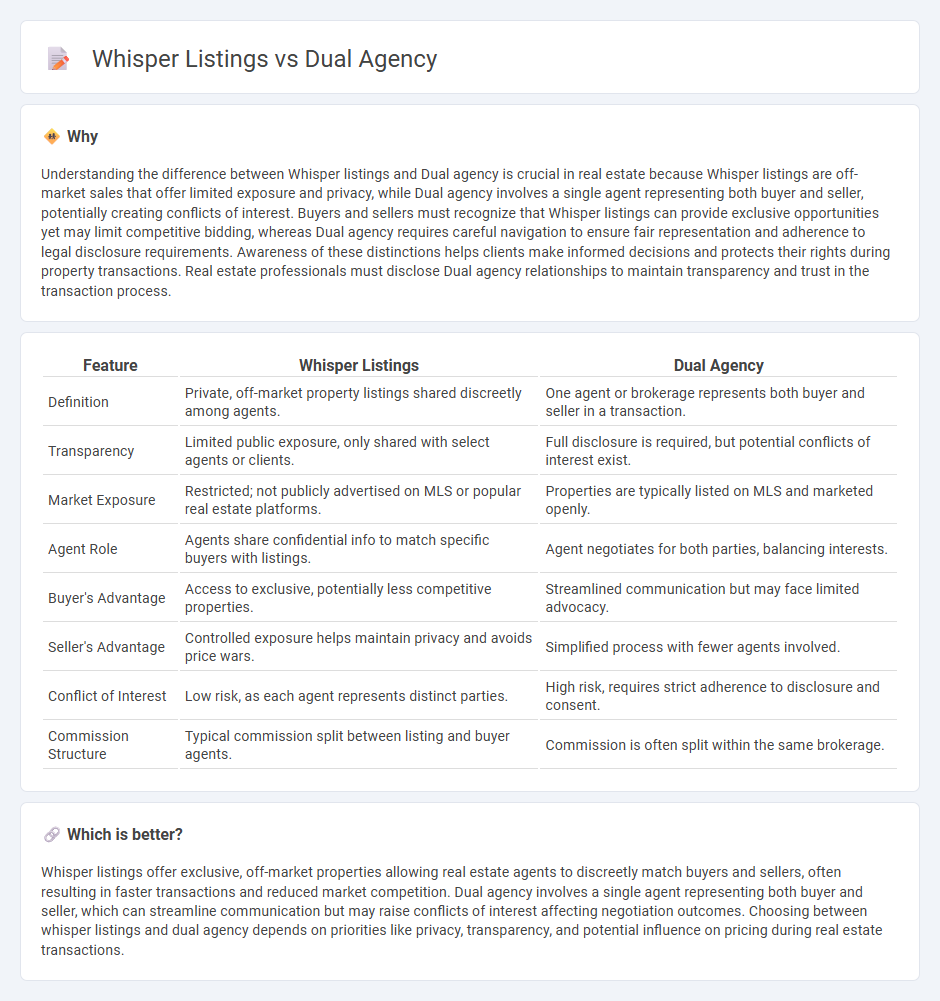
Whisper listings involve privately marketing properties to select buyers, maintaining confidentiality to create a competitive edge. Dual agency occurs when a single real estate agent represents both the buyer and seller in a transaction, raising potential conflicts of interest. Explore the benefits and risks of whisper listings versus dual agency to make informed real estate decisions.
Why it is important
Understanding the difference between Whisper listings and Dual agency is crucial in real estate because Whisper listings are off-market sales that offer limited exposure and privacy, while Dual agency involves a single agent representing both buyer and seller, potentially creating conflicts of interest. Buyers and sellers must recognize that Whisper listings can provide exclusive opportunities yet may limit competitive bidding, whereas Dual agency requires careful navigation to ensure fair representation and adherence to legal disclosure requirements. Awareness of these distinctions helps clients make informed decisions and protects their rights during property transactions. Real estate professionals must disclose Dual agency relationships to maintain transparency and trust in the transaction process.
Comparison Table
| Feature | Whisper Listings | Dual Agency |
|---|---|---|
| Definition | Private, off-market property listings shared discreetly among agents. | One agent or brokerage represents both buyer and seller in a transaction. |
| Transparency | Limited public exposure, only shared with select agents or clients. | Full disclosure is required, but potential conflicts of interest exist. |
| Market Exposure | Restricted; not publicly advertised on MLS or popular real estate platforms. | Properties are typically listed on MLS and marketed openly. |
| Agent Role | Agents share confidential info to match specific buyers with listings. | Agent negotiates for both parties, balancing interests. |
| Buyer's Advantage | Access to exclusive, potentially less competitive properties. | Streamlined communication but may face limited advocacy. |
| Seller's Advantage | Controlled exposure helps maintain privacy and avoids price wars. | Simplified process with fewer agents involved. |
| Conflict of Interest | Low risk, as each agent represents distinct parties. | High risk, requires strict adherence to disclosure and consent. |
| Commission Structure | Typical commission split between listing and buyer agents. | Commission is often split within the same brokerage. |
Which is better?
Whisper listings offer exclusive, off-market properties allowing real estate agents to discreetly match buyers and sellers, often resulting in faster transactions and reduced market competition. Dual agency involves a single agent representing both buyer and seller, which can streamline communication but may raise conflicts of interest affecting negotiation outcomes. Choosing between whisper listings and dual agency depends on priorities like privacy, transparency, and potential influence on pricing during real estate transactions.
Connection
Whisper listings, confidential property offerings known only to select agents, often coincide with dual agency situations where a single real estate agent represents both buyer and seller. This overlap raises ethical concerns such as potential conflicts of interest and reduced transparency in transactions. Buyers and sellers must exercise caution and seek clarity on agency representation to ensure fair negotiations in whispered and dual agency deals.
Key Terms
Fiduciary Duty
Dual agency involves a real estate agent representing both the buyer and seller, which can create conflicts in upholding fiduciary duties such as loyalty, confidentiality, and full disclosure. Whisper listings, often kept off the public market, raise concerns about transparency and fair representation, potentially compromising an agent's fiduciary responsibilities. Explore the nuances of fiduciary duty in these scenarios to understand the implications for buyers and sellers.
Disclosure
Dual agency involves a single real estate agent representing both the buyer and seller, requiring explicit disclosure to avoid conflicts of interest. Whisper listings are properties marketed quietly without public listing, demanding transparency to inform potential buyers about limited exposure. Learn more about legal implications and best practices in disclosure for effective real estate transactions.
Off-market
Dual agency occurs when a single real estate agent represents both the buyer and seller in a transaction, potentially leading to conflicts of interest, whereas whisper listings operate as off-market properties discreetly shared with select agents or buyers without public advertising, preserving seller privacy. Off-market whisper listings maintain exclusivity and limited exposure, often resulting in faster sales and less competition compared to traditional and dual agency listings. Explore how these strategies impact negotiation leverage and market dynamics for a deeper understanding.
Source and External Links
What Is Dual Agency, And Is It Risky? - Bankrate - Dual agency occurs when the same real estate agent represents both the buyer and the seller in a home transaction, which can be risky because the agent must balance fiduciary duties to two opposing parties and requires informed consent from both.
Dual agency: What to know before you buy - Rocket Mortgage - Dual agency means one agent works for both buyer and seller, which can streamline communication but creates conflicts of interest since the agent's highest priority becomes closing the deal rather than advocating fully for either party's best interest.
Dual Agency: When Is It Appropriate? - NCREC Bulletins - Legally, dual agency is only appropriate with full written consent from both buyer and seller and requires careful balancing of fairness, though some states prohibit it because of inherent conflicts of interest.
 dowidth.com
dowidth.com